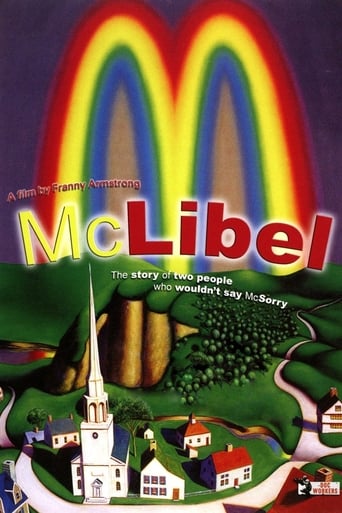

This movie is painful to watch. The two activists come across as petulant children railing against practically every injustice in the world that they can think of.The documentary fails to present a coherent argument. It's all over the map - in one minute they're complaining that killing chickens by beheading them isn't the most humane way to do it (but is that really true? they don't cover any alternatives) and in the next moment they're complaining that McDonald's is responsible for rain forest destruction (but they don't even say why! I guess because McDonald's uses paper? But so does every other company on earth).This film could have been better with more facts about the UK legal angle and much less anti-corporation propaganda.In trying to figure out what the concluding message of the film was, all I could come up with is that it showed what a waste of resources their case was and how pointless this all was. All it really did was feed millions of dollars to lawyers. But the fact that tying up the courts like this only benefits the lawyers is not really an interesting fact or anything new.
... View MoreMcLibel could have been an underdog story, but film makers had a different agenda. Morgan Spurlock (Supers Size Me) and Michael Moore (Fahrenheit 911) know how to make a documentary entertaining and still get their point across. You may disagree with the filmmakers but it is all-consuming watching the filmmaker unfold the argument in front of you. A more descriptive title would have been 'Greenpeace vs. McDonalds'. Franny Armstrong and the London Greenpeace folks shot for the publicity and controversy. McLibel (read Greenpeace) makes some valid points: in the UK when you go to trail you get legal representation unless if it is a libel case then you are on your own. Since large corporations have so much in resources ($$$) everyone will just apology rather than face an expensive court battle. McDonalds and other large corporations use their power and money to affect our buying habits through our children. Many corporations underpay their worker. However there is no counter-point. The movie spent 83 minutes explaining and fighting what is wrong with society but as far as a solution: 2 minutes to say approximately:'mega corporations are evil. We believe individuals should be making their own decisions on what products and services should be made available.' I see this as a radical stand and I am not sure how Greenpeace actually envisions this utopia. Are they suggesting that everyone should grow their own vegetables like one of the protagonist? Should society be sourcing commercial goods locally? Should we constrain advertising so we eliminate the 'push' market and end up with a 'pull' economy? All of these are a radical change in society. Sorry Greenpeace, there are things I dislike about our society but a socialist reform is not the answer. (6 people found this review helpful.)
... View MoreThis is a low budget but very, very entertaining account of Helen Steel and David Morris's fight against McDonalds. They were caught distributing leaflets accusing McDonalds of polluting the environment, cruelty to animals, aiming their produce at children and being extremely unhealthy and lying about it. McDonalds claimed they were lying, so the postman and the gardener represented themselves in a 7 year court case. This documentary charts the trial and verdict, and further footage after the event. It is cheap and cheerful, but astounding in it's simplicity. This was a landmark case that made it acceptable to challenge corporations, in fact, it almost seems to be the pre runner for many documentaries out there. More importantly, it took the wind out of McDonald's sails and forced them to readdress many of the issues they were challenged over. It's a great film - I recommend it.
... View MoreMcLibel follows the path of two English activists who after speaking out against McDonald's notorious commercial practices, (and unlike fellow activists) refuse to bow to the corporate giant's formidable legal machine.What has to be remembered is that it was McDonalds who initiated the legal action knowing, that Dave and Helen would not be allowed legal aid to defend themselves. At the Strasborg Court of Human Rights this unfair one sided draconian British legislation was recognised as being unfair, for the way it impeded their freedom of speech.The two activists' greatest asset was that they had no assets and nothing to lose, as they literally just kept going. Both of them being uncharismatic actually lent them some charm, as the press were forced to focus fully on the issues unable to cash in on their personalities.When it was all over the two heroes carried on with their humble lives, uninterested in cashing in on their success and seeking the limelight.My favourite line from McLibel is Helen saying, "I'm actually starting to feel sorry for McDonalds now, all this negative publicity is helping out other Corporations such as Pizza Hut, and Burger King who are equally as bad if not worse than McDonalds"
... View More